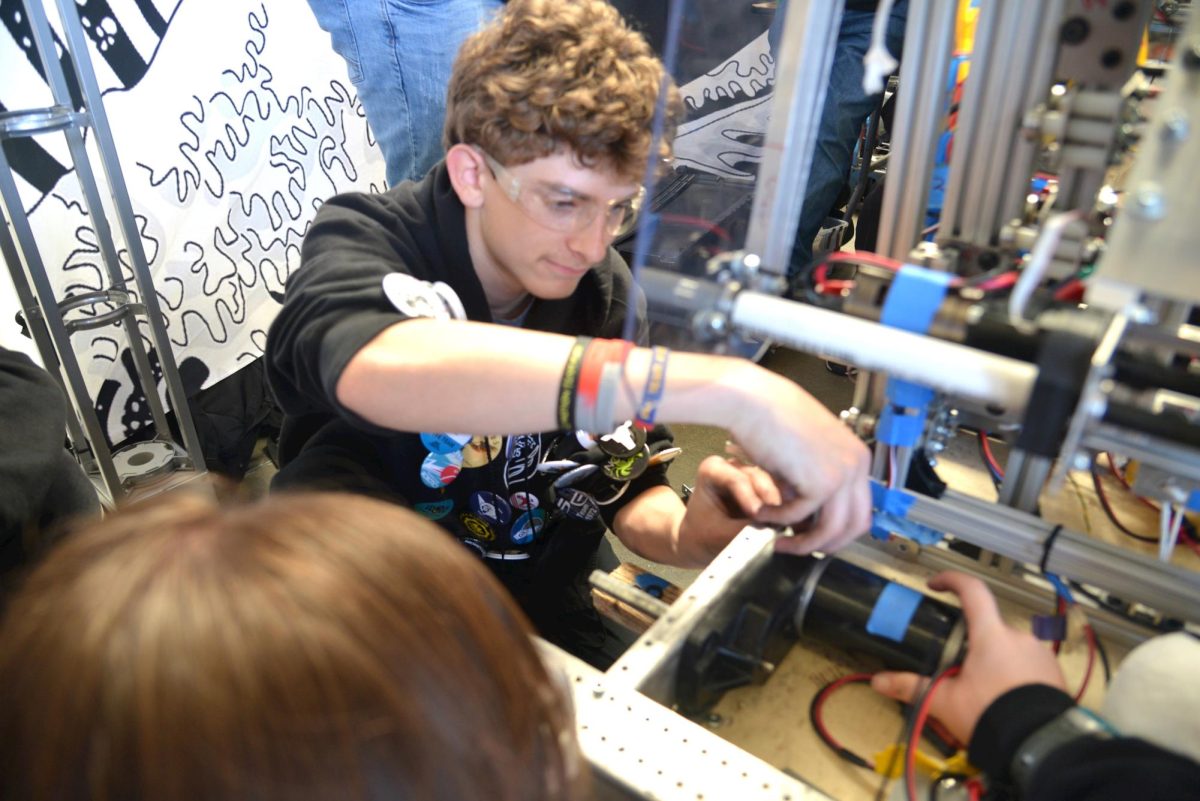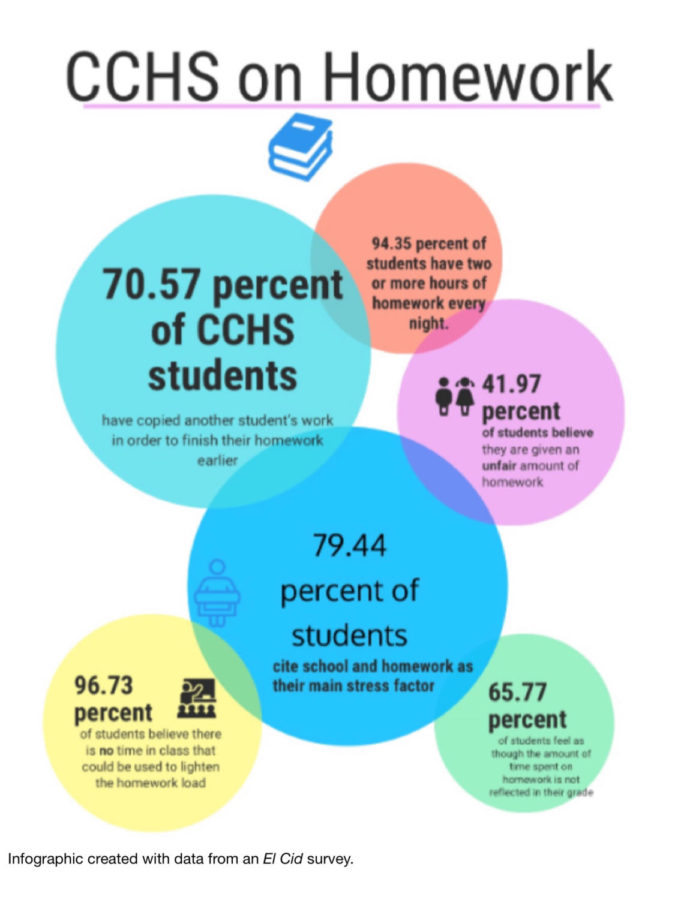Time to separate home and work?
The infographic show the results of a recent El Cid survey of approximately 336 Cathedral Catholic High School Students.
As Cathedral Catholic High School parent Mrs. Brigid Hannon watches her daughter battle to complete her homework late into the night, she wonders about the necessity of such a workload as it impacts her daughter’s mental and physical health.
“There have been many times, about every other week, when I have allowed my child to stay home from school in the morning in order to complete homework because it was 11:30 at night, and she was still struggling with it,” Mrs. Hannon said.
Homework is an integral part of the education system, but as student complaints about the rigorous workload roar progressively louder, educators, students, and parents are forced to reevaluate the benefits and detriments of homework.
According to a 2014 study by Stanford University, excessive homework leads to sleep deprivation and other health problems, such as headaches, weight loss, and stomach problems. Sleep deprivation leaves students too exhausted to focus while in their classes, putting them further behind in their work.
While homework takes away from students’ ability to sleep, it also eliminates any opportunity for students to engage in self-developing hobbies.
“[The homework load] tends to be a lot with sports and my commute, so that definitely affects my sleep and my ability to spend time doing things I enjoy,” CCHS student Cameron Nash ‘20 said.
In addition to placing students at an academic disadvantage, sleep deprivation negatively affects the health of teenagers.
According to the National Sleep Foundation, a nonprofit organization that promotes public understanding of sleep and sleep disorders, teenagers need approximately eight to 10 hours of sleep to perform at their peak. However, a study cited by NSF shows only 15 percent of teenagers sleep eight hours on school nights.
“I go to school for six and a half hours, and then I come home and have four more hours of work,” CCHS student Ethan Hardisty ‘20 said. “I have football as well, so I get home late and stay up late doing homework. I don’t get much sleep.”
Consistent sleep deprivation takes a toll on students, and it leads to desperate decision making. According to an El Cid survey of CCHS students, 70.57 percent of students reported they had copied another student’s homework in order to finish sooner. In those instances, the homework did not benefit the student.
Despite these findings, teachers still assign large amounts of homework, begging the question: What is the benefit of homework?
“In a course like advanced placement world history, we are given essentially an impossible task of learning the entirety of world history in one school year’s time,” CCHS social science teacher Mr. Daniel Collins said. “There’s just not enough time to go over everything in class, so students are responsible for covering a lot of the information on their own. By assigning homework, I try to keep students accountable for the reading they are expected to be doing.”
Although teachers assign homework to ensure students do the reading and practice, many students believe the method is ineffective. In addition, according to the El Cid poll, 49.85 percent of students believe homework, in addition to a 6.5 hour school day, is not necessary for material mastery.
“The homework doesn’t really help me, and it just makes me tired,” Hardisty said. “It’s difficult to work on it after a long day at school.”
Whether or not homework helps students, the majority of students agree time in class is wasted.
When polled, 96.73 percent of CCHS students felt there is at least some time spent in class that could be better used to lighten the homework load, with 30.95 percent reporting there is a great deal of time that could be used this way.
“At first, I thought that it was her lack of attention or her ability to be distracted, but when a child comes home every night after practice, lays down for 20 minutes, gets up, eats dinner, and then has four hours of homework, that is too much homework,” Mrs. Hannon said.
Only 30.06 percent of students believe they receive a fair amount of homework, and when viewed alongside the sleep deprivation rates, their cries for less homework appear justified. However 58.04 percent of CCHS students state homework aids their understanding of the material a moderate amount or greater.
“Homework definitely increases mastery in all subjects across the board,” Nash said.
Even though homework is seen as a chore, students must appreciate the benefits.
Homework does help students and should be a part of education, even though it does not help all individuals, Hardisty said.
Teachers especially notice the benefits of homework when they reflect upon grade trends.
“The easiest trend is that the students who don’t do the homework don’t do well on the test,” social science teacher Mr. Matthew White said. “In general, the students [who] keep up on the homework do well in the class.”
While understanding the material better inevitably raises grades, having a separate homework portion of the grade has rescued many grades. The poll showed that 53.27 percent of students have had homework positively impact their grade.
In history classes, homework accounts for 30 percent of the grade. Therefore, it has the capacity to raise or lower students’ grades, Mr. Collins said.
Some students rely on the extra points homework gives them in the grade book, especially if they struggle with tests.
However, when homework takes away from valued family time, it drives a wedge between students and their families, and becomes a much greater issue, Mrs. Hannon said.
“[My daughter] has so much homework that she has to start it Friday night, work on it all day and night Saturday, and all day and night Sunday, and she only shows her head for dinner,” Mrs. Hannon said. “I don’t see her for three days, and I don’t see it getting better any time soon.”

As I ecstatically enter my senior year and second year on El Cid, I look forward to my new position of Social Media Editor, which I plan to take to new...























































Mr. Ryan Smith • May 5, 2021 at 12:33 AM
I am happy you’re writing about this. We need more dialogue between teachers and students on this issue! Students too often don’t understand the purposes of homework and teachers don’t understand the difficult reality for students. Thank you.